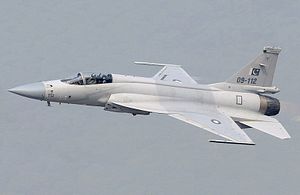Development and production of the Pakistan Aeronautical Complex/Chengdu Aerospace Corporation (PAC/CAC) JF-17 “Thunder” Block III multirole fighter aircraft is reportedly underway, the chief designer of the fighter jet, Yang Wei, said at press conference in China last week.
“All related work is being carried out,” Yang was quoted as saying by Chinese state media. “The third block will see the JF-17’s informatized warfare capability and weapons upgraded.” As I reported previously, JF-Block-III fighter jets are expected to receive the Chinese-made KLJ-7A active electronically scanned array (AESA) radar system. It would be the Pakistan Air Force’s first AESA-equipped fighter aircraft.
JF-17 Block III aircraft will reportedly also feature a new electronic warfare system, upgraded avionics including a three-axis fly-by-wire digital flight control system, and a helmet-mounted display and sight system. With its new integrated sensor package, the aircraft will have the capability for quick information sharing and network-enabled operations that facilitate earlier detection and interception of enemy aircraft.
When discussing the start of aircraft production, Yang was most likely referring to the manufacturing of the JF-17’s airframe, with PAC reportedly producing 58 percent and CAC 42 percent of it. The development status of any of the new Block III subsystems is not known. However, once the Nanjing Research Institute of Electronics Technology (NRIET) completes development of the new AESA radar system, it “can be fitted on the airframe very fast, ensuring a quick delivery time,” Yang emphasized.
(Notably, Yang in his comments named neither NRIET nor the exact AESA radar system to be installed on the JF-17 Block III.)
JF-17 Block I and Block II aircraft, of which the PAF operates around 85 in total as of March 2019, have been fitted with NRIET’s older KLJ-7 X-band fire control radar. All three JF-17 variants are powered by a Chinese license-built Klimov RD-93 (an RD-33 derivative) turbofan engine. The JF-17 has an approximate combat radius of up to 1,200 kilometers without refueling and can reach a maximum speed of up to Mach 1.6.
The JF-17 costs $25 million per unit, although the Block III per-unit price is expected to go up as a result of the new subsystems, including the expensive new AESA radar system. The PAF intends to procure up to 50 new Block III aircraft.
The aircraft can alternatively be armed with air-to-air, air-to-surface, and anti-ship missiles. It will also be able to fire beyond-visual-range air-to-air missiles (BVRAAM). An unnamed BVRAAM was test fired by the PAF last month and possibly today.
During a recent military standoff with India, a PAF JF-17 may have engaged an Indian Air Force fighter jet.
































